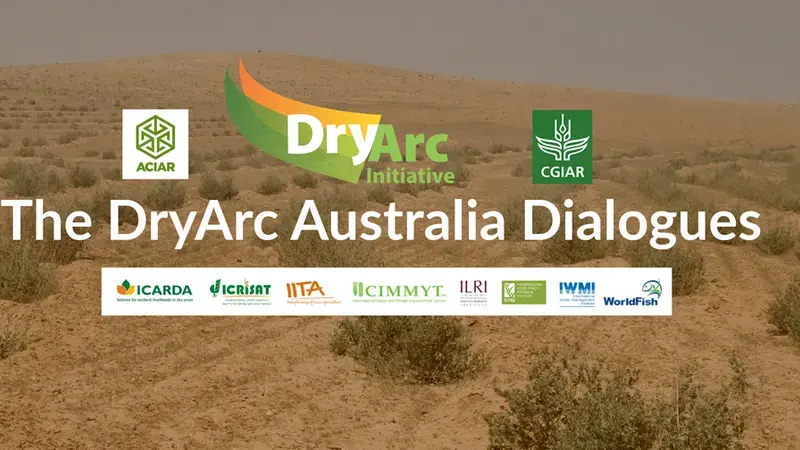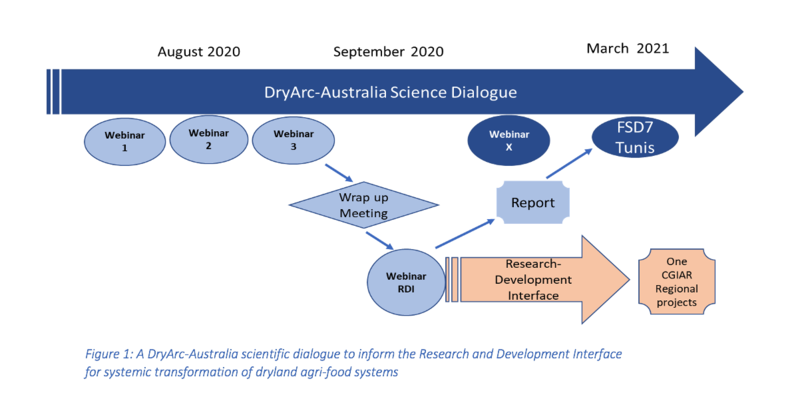The DryArc Australia Dialogues

We are thrilled to announce upcoming webinars in which dryland scientists from Australia and the CGIAR join forces with development practitioners, government research representatives, and other key stakeholders, to discuss crucial approaches that tackle agricultural challenges affecting global dry regions in Australia, Africa, and Asia.
Coordinated by ICARDA and the Australian Centre for International Agricultural Research (ACIAR), three upcoming webinars will foster dialogue that taps into participants’ collective knowledge and experience, shares vital perspectives and lessons, and identifies research priorities for the systemic transformation of dryland agriculture on the Australian, African and Asian continents. Discussions will take place within the framework of the CGIAR regions, strategies, and SDGs, and require comprehensive rural development system approaches that link resource management, production, value chains, and rural business entrepreneurship and income generation.
The DryArc Initiative aims to improve and streamline dryland agricultural innovations, integrating them into agri-food systems and settings, to maximize their potential to strengthen resilience, enhance food and nutrition security, and increase employment in dry regions, especially that of women and youth. The initiative aims to comprehensively address the 2030 Agenda for Sustainable Development, account for trade-offs, and amplify synergies across SDGs, sectors, and scales. The DryArc Initiative is a collaboration between eight CGIAR centers including ICARDA, ICRISAT, IITA, IFPRI, IWMI, WorldFish, CIMMYT, and ILRI. ICRAF-CIFOR will also attend as participatory partners.
Forty-Four percent of the world’s food production, including half its livestock, is located in the global dry areas. Yet of the 2.5 billion people who live there, almost twenty percent live in chronic poverty, especially in dry areas stretching from Mauritania to China, and scattered through Sub-Saharan Africa. As climate change intensifies, farmers face serious water scarcity, climate variability, severe environmental degradation, and extreme temperatures and drought. In developed dry regions such as Australia, the driest inhabited continent in the world, degradation is common across many agro-ecologies and Australian farmers experience greater annual volatility in yield and price than most global farmers.
Numerous innovations and technologies are available to improve dryland agriculture, enhance productivity, and adapt to the changing climate, yet these are hindered by inadequate means of sharing knowledge (including successes and failures) around the implementation of technologies and innovations into agri-food systems.
The workshops will explore ongoing initiatives to find a way to ensure vital science and innovations are adequately shared, investigated, and available for the sustainable and systemic transformation of global agri-food systems to meet increasing challenges posed by intensifying climate change.
Each webinar integrates biophysical and socioeconomic-institutional science and addresses the following topics:
-
Webinar 1: Plugging the rainfed gap and de-risking sustainable intensification in cereal-based systems (including legumes, forages, and livestock);
-
Webinar 2: Resilience and livelihood in low rainfall agro-silvopastoral systems with integrated rangeland management and water harvesting;
-
Webinar 3: Effective research-development interfaces for the systemic transformation of the drylands
Supplementary science webinars may also be arranged on specific additional research topics to continue the Science Dialogue. For example, food and feed production under saline soils and water is a potential topic of common interest for Australia and CGIAR.
The insights and conclusions from the webinars will be pitched at the next Research Development Interface webinar with development institutions operating in the drylands. They will be summarized in a report to inform follow up discussions with development partners, policymakers, and investors.
In addition, the 7th Farming System Design Symposium in March 2021 in Tunis (co-organized by ICARDA-CIHEAM-IRESA-FAORNE) will be an essential milestone to discuss potential R4D projects for the systemic transformation of the drylands of Asia and Africa.
We look forward to productive, open, and inspiring discussions. Updates will be published across social media and in a post-event news alert summarizing key points and outcomes as a precursor for the official report. We warmly thank all participants in advance for their dedication and efforts.


